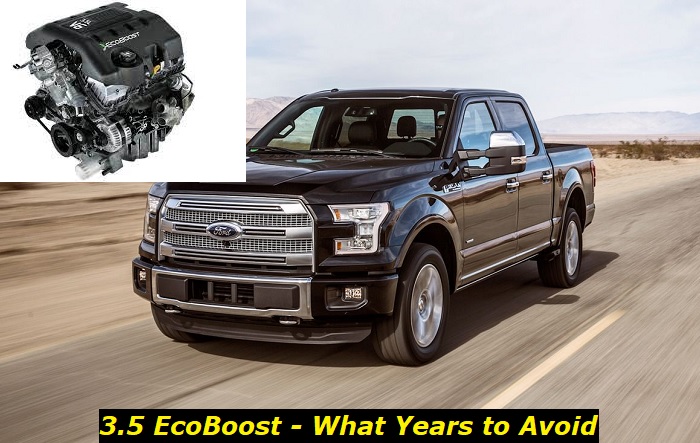The Ford 3.5 EcoBoost is, as we're sure most of you will agree, one great engine. It's modern and efficient, delivering the same amount of power, if not more, than previous V8 engines, but with less fuel consumption and less emissions. What's there not to like? They are reliable too... or are they?
We would avoid 2011-2012 models of the 3.5 EcoBoost. These are the first years of the engine, a lot of flaws that were corrected are present there. Also, 2017-2020 engines are not the best choice. Why? Because in 2017 the 3.5 EcoBoost was reengineered and these are the first years of the new generation.

Key features and my opinion about the engine
- Production years:2010-now
- Average lifespan of 3.5L EcoBoost:190,000-220,000 miles
- Fuel supply type:direct injection
- Power range:310-660 hp
- Fuel efficiency:average
- Engine block material:aluminum
- Engine reliability score:medium
- The most common problems:intercooler problems, timing chain stretching, carbon buildup on intake valves, coolant and oil leaks.
Which are the least reliable 3.5 EcoBoost engines?
Before going any deeper into this topic, we believe that it's important for you to know that regardless of make, model, and the year of manufacturing, the most important aspect is engine maintenance. Even if there are certain engines that are considered to be bulletproof, poor maintenance will almost certainly affect them too, since no engine is indestructible.
Going back to the question, here are the years that we think you should pay more attention to:
2011 - 2012 3.5 EcoBoost: worst years?
The 3.5 EcoBoost engine was introduced by Ford back in 2010 and, as with any new engine, there have been some issues in the first few years of its life. Here are some of them:
1) Carbon build-up
We can't say the problem was solved in the newer engines but somehow the first years are blames for extensive carbon buildup. This is caused by the direct injection system. There is no fuel coming thought the intake valves to clean them.
Of course, it's important to note that city driving leads to severe carbon buildup in any generation of the 3.5 EcoBoost. This is because the engine is not heated properly and works mainly at low RPM.
2) Timing chain issues
Owners have reported some timing chain issues with engines from the first generations and this is definitely something that you should pay attention to since timing chain failure can lead to permanent engine damage. One way you can tell that there's something wrong with the timing chain is if there's a quite strong rattling noise a few seconds after you've started the vehicle.
If that's the case, then, the timing chain is stretched too much and it is on its last legs. Sometimes, this issue can be fixed just by replacing the tensioner, but it might not always be the case and we would recommend you replace all the parts related, such as the chain, guides, and tensioners.
3) Turbocharger failure
Turbocharger failure isn't something unheard of when it comes to the first generation of 3.5 EcoBoost engines and you should definitely pay attention to this aspect. If the turbochargers are faulty, the engine power will be drastically reduced, which would greatly affect the drivability of the vehicle.
Usually, when they are bad, you can tell this by the fact that there's a warning in the instrument cluster and the engine lacks power. We would also recommend you listen carefully to any sort of strange noises, such as loud whistling and whooshing noises, which are common to failing turbochargers.
4)Oil leaks
Oil leaks seem to affect quite a lot of the first-generation 3.5 EcoBoost engines, so we would recommend you check for them thoroughly. Look for any wet spots inside the engine bay or even under the vehicle, especially if it has been parked for a while.
2017 - 2020 3.5 EcoBoost - more years to avoid
Even though some of the previous issues have been fixed, with the newer generation of engines, others have made their appearance. Here are some of the common issues:
1) Cam phasers
Failed cam phasers are one of the most common issues of the 3.5 EcoBoost engine. The way you can tell if they are faulty is to listen carefully for any rattling or ticking noises. Unlike the timing chain noise, in this case, the rattling can be present at all times or when accelerating. Another way you can tell that there are cam phaser issues is that the engine shudders.
Even though Ford tried reprogramming the vehicle's PCM to reduce the rattling, this didn't always fix the problem. The good news is that this issue is less likely to provoke any serious damage to the engine, but we would still recommend you have this issue checked by a specialist.
2) Ignition coil & spark plug issues
Another common failure point would be both the ignition coils and the spark plugs. Of course, these are both serviceable items and they will need replacing on any other car, but they seem to fail a lot more often on the 3.5 EcoBoost engine.
When one of them is faulty, you will most likely end up with a warning light in the instrument cluster of the car, more precisely, the Check Engine Light (CEL). This issue can also cause all sorts of running problems, such as misfires and rough idle, or even engine stuttering.
Which are the most reliable 3.5 EcoBoost engines?
Now that we've talked about the least reliable versions of this engine, we believe that it's time to talk about the versions that seem to have the least problems.
If we take a look again at what the common failure points are for each of the two generations of 3.5 EcoBoost engines, we will probably get to the conclusion that the second generation (2017+) would be the best, since they have fewer specific problems.
Thinking like this isn't wrong, especially if you take into account the fact that engines produced after 2020 have also been updated and it seems that they have, at least for now, gotten rid of the remaining problems.
However, we believe that the best engine is a well-maintained one, so regardless of the version, we recommend you check the service history and make sure that all of the specific issues have been dealt with and that the engine has been regularly serviced.
Even if the second-generation engines might have fewer specific issues, if you end up with one that simply hasn't been maintained properly, it can soon turn into a nightmare, so please keep in mind that good maintenance is always the key to a reliable engine.
How to extend the 3.5 EcoBoost's lifespan?
When it comes to extending a 3.5 EcoBoost engine's lifespan, you could perform a number of simple operations, which could also apply to any other engine of this sort, such as:
1) Perform regular services
Using only the recommended fluids and parts by the manufacturer will always give good results when it comes to reliability. If you are a bit skeptical, you could even try to perform oil services at shorter intervals, such as 5000 miles. This might be a little bit more expensive, but it will certainly not harm the engine.
2) Fix the issues as soon as they appear
If you have, for example, issues with the timing chain rattling, ignoring this issue will simply lead to permanent engine damage. We think it's better to avoid driving the vehicle if you simply do not have the time or money to fix it as soon as you notice the issue.
3) Avoid driving too hard if not necessary
This is something quite obvious, but there are still many people out there that still don't see an issue with driving a vehicle hard all the time. By doing so, you are putting a lot of stress not only on the engine but on all of the other components of the vehicle, most often resulting in permanent damage.
Just think about this: racecars are driven hard all of the time and they require engine rebuilds very often, if not after every race. Do you think your car is stronger than a racecar?
Should you buy or should you avoid these engines?
To put it short, we think that you should buy a vehicle equipped with one of these engines since they are modern, efficient, and generally reliable. There are a few years in which there have been some issues, but with proper servicing, you shouldn't face any problems.
About the authors
The CarAraC research team is composed of seasoned auto mechanics and automotive industry professionals, including individuals with advanced degrees and certifications in their field. Our team members boast prestigious credentials, reflecting their extensive knowledge and skills. These qualifications include: IMI: Institute of the Motor Industry, ASE-Certified Master Automobile Technicians; Coventry University, Graduate of MA in Automotive Journalism; Politecnico di Torino, Italy, MS Automotive Engineering; Ss. Cyril and Methodius University in Skopje, Mechanical University in Skopje; TOC Automotive College; DHA Suffa University, Department of Mechanical Engineering






Add comment